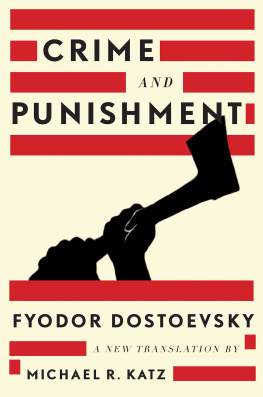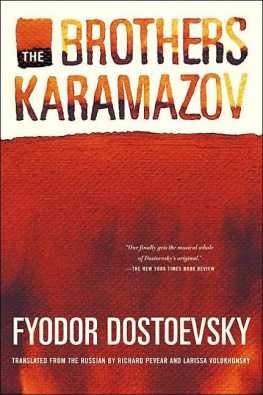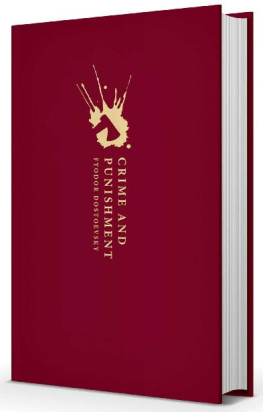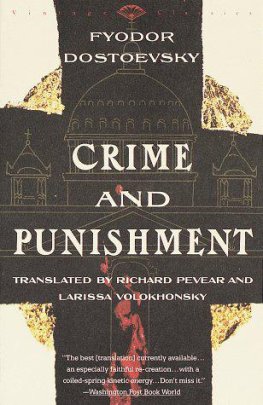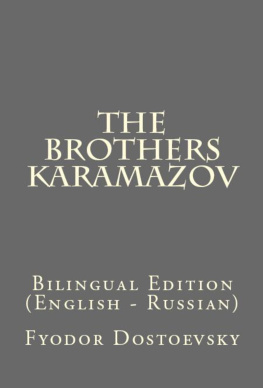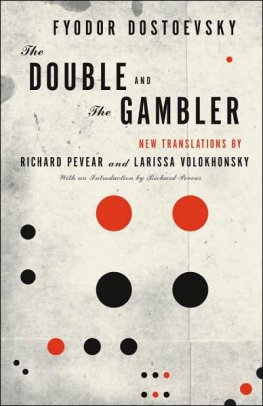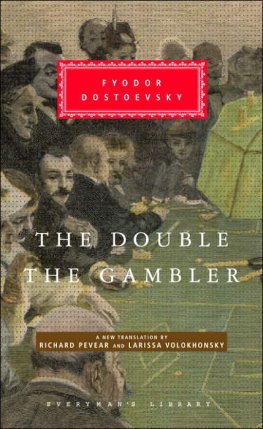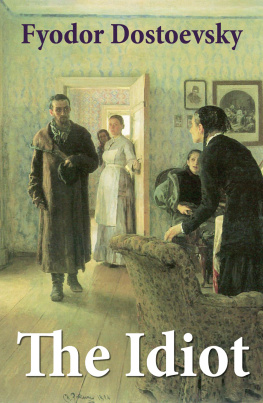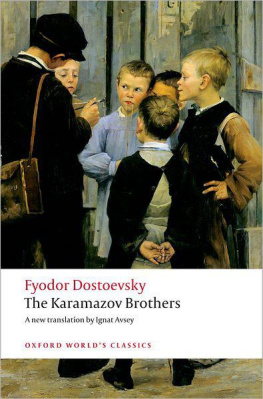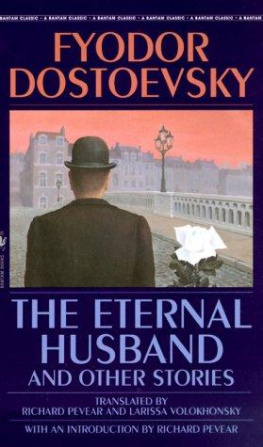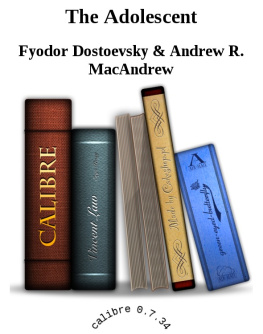Fyodor Dostoevsky - The Eternal Husband (Hesperus Classics)
Here you can read online Fyodor Dostoevsky - The Eternal Husband (Hesperus Classics) full text of the book (entire story) in english for free. Download pdf and epub, get meaning, cover and reviews about this ebook. year: 2007, publisher: Hesperus Press, genre: Art. Description of the work, (preface) as well as reviews are available. Best literature library LitArk.com created for fans of good reading and offers a wide selection of genres:
Romance novel
Science fiction
Adventure
Detective
Science
History
Home and family
Prose
Art
Politics
Computer
Non-fiction
Religion
Business
Children
Humor
Choose a favorite category and find really read worthwhile books. Enjoy immersion in the world of imagination, feel the emotions of the characters or learn something new for yourself, make an fascinating discovery.
- Book:The Eternal Husband (Hesperus Classics)
- Author:
- Publisher:Hesperus Press
- Genre:
- Year:2007
- Rating:5 / 5
- Favourites:Add to favourites
- Your mark:
- 100
- 1
- 2
- 3
- 4
- 5
The Eternal Husband (Hesperus Classics): summary, description and annotation
We offer to read an annotation, description, summary or preface (depends on what the author of the book "The Eternal Husband (Hesperus Classics)" wrote himself). If you haven't found the necessary information about the book — write in the comments, we will try to find it.
The Eternal Husband (Hesperus Classics) — read online for free the complete book (whole text) full work
Below is the text of the book, divided by pages. System saving the place of the last page read, allows you to conveniently read the book "The Eternal Husband (Hesperus Classics)" online for free, without having to search again every time where you left off. Put a bookmark, and you can go to the page where you finished reading at any time.
Font size:
Interval:
Bookmark:
Summer cameand Velchaninov, beyond all expectation, stayed in Petersburg. His trip to the south of Russia fell through, and there was no end to his case in sight. This case a lawsuit over an estatewas taking a most nasty turn. Three months earlier it had looked quite uncomplicated, all but indisputable; but everything had changed somehow suddenly. "And generally everything has begun to change for the worse!"Velchaninov began repeating this phrase to himself gloatingly and frequently. He hired a clever, expensive, famous lawyer, and did not mind the cost; but in impatience and from insecurity he got to busying himself with the case as well: read and wrote documents which the lawyer uniformly rejected, kept running around to various offices, made inquiries, and most likely hindered everything considerably; at least the lawyer complained and urged him to go to the country. But he could not even make up his mind to go to the country. The dust, the stuffiness, the white nights of Petersburg, which chafed his nervesthis was what he enjoyed in Petersburg. His apartment, recently rented, was somewhere near the Bolshoi Theater, and this, too, had not worked out; "nothing works out!" His hypochondria was increasing day by day; but he had long been inclined to hypochondria.
This was a man who had lived much and broadly, now far from young, about thirty-eight or even thirty-nine, and all this "old age"as he himself put ithad come upon him "almost quite unexpectedly"; but he understood himself that he had aged not in the quantity, but rather, so to speak, in the quality of his years, and that if his infirmities had indeed begun, it was rather from within than from without. By the look of him, he still seemed a fine man. He was a tall and sturdy fellow, with thick, light brown hair and not a trace of gray on his head, and with a long brown beard almost halfway down his chest; as if somewhat clumsy and gone to seed at first sight, but, on closer inspection, you would at once discern in him a gentleman of excellent seasoning and who had once received a most high-society upbringing. Now, too, Velchaninov's manners were free, bold, and even graceful, despite all his well-acquired peevishness and bagginess. And even to this day he was filled with the most unshakable, most impudent high-society self-confidence, the extent of which he perhaps did not suspect in himself, despite his being not only an intelligent, but sometimes even a sensible man, almost educated and unquestionably gifted. The color of his face, open and ruddy, had been distinguished in the old days by a feminine tenderness and had attracted the attention of women; now, too, someone would look at him and say: "There's a hale fellow! Hale and hearty!" And yet this "hale fellow" was cruelly afflicted with hypochondria. His eyes, large and pale blue, also used to have much winsomeness in them ten years ago; they were such light, such merry and carefree eyes, that they inadvertently attracted everyone he came across. Now, nearing the age of forty, the brightness and kindness had almost died out in these eyes, already surrounded with light wrinkles; there appeared in them, on the contrary, the cynicism of a weary and not entirely moral man, cunning, mockery most often, and another new shade that had not been there before: a shade of sorrow and paina sort of distracted sorrow, as if without object, but intense. This sorrow was especially manifest when he was left alone. And, strangely, this man, so boisterous, merry, and carefree just two years ago, who was so good at telling such amusing storiesnow liked nothing better than to be left entirely alone. He deliberately abandoned his numerous acquaintances, whom even now he might not have abandoned, despite the definitive disorder of his financial situation. True, vanity also helped here: with his insecurity and vanity it was impossible to endure former acquaintances. But his vanity, too, began gradually to change in isolation. It did not diminisheven quite the contrary; but it began to degenerate into some peculiar sort of vanity, which had not been there before; he began to suffer sometimes from entirely different causes than usual beforefrom unexpected causes, entirely unthinkable before, from "more higher" causes than previously"if it can be put that way, if there actually are higher and lower causes... That he added himself.
Yes, he did come to that as well; he was now struggling with some higher causes, of which he had not even stopped to think before. In his mind and according to his conscience, he called "higher" all those "causes" which (to his surprise) he was in no way able to laugh at in himselfsomething which had not happened till thenin himself, naturally; oh, in society it was a different matter! He knew perfectly well that the circumstances needed only to ariseand the next day he would quite calmly renounce, aloud, despite all the mysterious and reverential decisions of his conscience, all these "higher causes" and himself be the first to make fun of them, naturally without admitting anything. And this was indeed so, despite the certain, even quite considerable, share of independence of thought he had won lately from the "lower causes" that had hitherto possessed him. And how many times, getting out of bed in the morning, had he begun to be ashamed of the thoughts and feelings he had lived through during the night's insomnia! (And of late he had been suffering constantly from insomnia.) He had long since noticed that he was becoming extremely insecure in all things, both important and trifling, and therefore he resolved to trust himself as little as possible. However, certain facts stood out which could in no way be acknowledged as actually existing. Of late, at night sometimes, his thoughts and sensations changed almost completely as compared with his usual ones and for the most part did not at all resemble those that fell to the first half of his day. He was struck by thisand even consulted a famous doctor, though, true, the man was his acquaintance; naturally, he brought it up jokingly. He received the response that the fact of a change and even a splitting of thoughts and sensations at night during insomnia, and at night generallyis a universal fact among people of "strong thoughts and strong feelings"that the convictions of a whole lifetime would sometimes change all at once under the melancholy influence of night and insomnia; suddenly, out of the blue, the most fateful decisions would be taken; but that, of course, there is measure in all thingsand if, finally, the subject feels this split too much, so that it reaches the point of suffering, that is unquestionably a sign that illness has set in; and therefore something ought to be undertaken without delay. Best of all would be to change one's way of life radically, to change one's diet or even undertake a journey. A laxative would, of course, be helpful.
Velchaninov listened no further, but for him the illness was fully proven.
"And so all this is just an illness, all this 'higher' is just an illness and nothing more!" he sometimes exclaimed caustically to himself. He wanted very much not to agree.
Soon, however, the same thing that used to happen in exclusively nighttime hours began to repeat itself in the mornings, but with greater bile than at night, with anger instead of repentance, with mockery instead of tenderheartedness. Essentially, it was certain events from his past and long-past life that returned more and more often to his memory, "suddenly and God knows why," but that returned in some special way.
Velchaninov had long been complaining, for instance, of a loss of memory: he would forget the faces of his acquaintances, who would get offended with him when they met; a book read six months earlier would sometimes be completely forgotten in that length of time. And what then?despite this obvious daily loss of memory (which worried him very much)all that had seemed long past, all that had even been completely forgotten for ten, for fifteen yearsall this now suddenly came back to his memory, but with such an amazing precision of impressions and details that it was as if he were living it over again. Some of the facts he remembered had been so well forgotten that it seemed miracle enough to him that they could be remembered. But that was not yet all; for who among people who have lived broadly does not have memories of a certain sort? But the thing was that all these remembrances now came back as if with some completely new, unexpected, and previously quite unthinkable point of view on the fact, as if prepared by someone. Why did certain memories now seem altogether criminal to him? And these mental judgments were not the only thing; his dark, solitary, and sick mind he might not have believed; but it went as far as curses and all but tears, inwardly if not outwardly. Two years ago he would not have believed it if he had been told he would one day weep! At first, however, what he remembered was more of a caustic than of a sentimental sort: he remembered certain social mishaps, humiliations; he recalled, for instance, how he had been "slandered by some intriguer," with the result that he stopped being received in a certain househow, for instance, and even not so long ago, he had been positively and publicly offended and had not challenged the offender to a duelhow he had once been brought up short by a most witty epigram, in a circle of the prettiest women, and had been at a loss for a reply. He even remembered two or three unpaid debts, trifling ones, true, but debts of honor, and to such people as he no longer kept company with and of whom he had even begun to speak ill. He also suffered (but only in the most evil moments) from the remembrance of two most foolishly squandered fortunes, each of them considerable. But soon he also began to have remembrances of "higher" things. Suddenly, for instance, "out of the blue" he remembered the forgottenand forgotten by him in the highest degree figure of one kindly little official, gray-haired and ridiculous, whom he had insulted once long, long ago, publicly and with impunity and solely from braggadocio: only so as not to lose a funny and fortunate quip, which brought him fame and was repeated afterward. He had forgotten the fact so well that he could not even remember the old man's last name, though all the circumstances of the adventure presented themselves with inconceivable clarity. He vividly remembered that the old man was then defending his daughter, who lived with him and had gone too long unmarried, and of whom some sort of rumors had begun to spread in town. The old man tried to respond and got angry, but suddenly burst into sobs before the whole company, which even produced a certain impression. They ended by getting him drunk on champagne for the fun of it, and had themselves a good laugh. And now, when Velchani-nov remembered "out of the blue" how the old fellow had wept, covering his face with his hands like a child, it suddenly seemed to him that he had never forgotten it. And, strangely, all this had seemed very funny to him at the time; but now quite the contrary, and precisely in the details, precisely in the covering of his face with his hands. Then he remembered how, solely for the sake of a joke, he had slandered the very pretty wife of a schoolteacher, and the slander had reached the husband. Velchaninov had soon left that little town and did not know how the consequences of his slander had ended, but now he suddenly began to imagine the end of those consequencesand God knows where his imagination might have taken him, if a much closer memory had not suddenly presented itself, of a certain girl, from simple tradespeople, whom he did not even like and of whom, he had to confess, he was ashamed, but whom, not knowing why himself, he got pregnant, and then just abandoned along with the child, without even saying good-bye (true, he had no time), when he left Petersburg. Afterward he looked for the girl for a whole year, but was simply unable to find her. However, there turned out to be perhaps hundreds of such memoriesand it even seemed that each memory dragged dozens of others after it. Gradually his vanity also began to suffer.
Font size:
Interval:
Bookmark:
Similar books «The Eternal Husband (Hesperus Classics)»
Look at similar books to The Eternal Husband (Hesperus Classics). We have selected literature similar in name and meaning in the hope of providing readers with more options to find new, interesting, not yet read works.
Discussion, reviews of the book The Eternal Husband (Hesperus Classics) and just readers' own opinions. Leave your comments, write what you think about the work, its meaning or the main characters. Specify what exactly you liked and what you didn't like, and why you think so.


